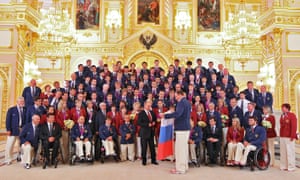The International Paralympic Committee is set to do what its Olympic counterpart did not and ban Russia outright from its Games later this month, the Observer has learned.
In the wake of the publication of Professor Richard McLaren’s report that revealed jaw-dropping details of systemic doping in Russia, the IPC provisionally suspended Russia from the Paralympics.
It is understood that after gathering further evidence from McLaren and giving the Russian Paralympic Committee the opportunity to make its case, a provisional decision has been made. The IPC is to announce its decision at a press conference in Rio on Sunday.
The IPC board met the Russians in Bonn on Wednesday to consider its written and oral arguments in a three-hour meeting. Barring a last minute change of heart, the Russian Paralympic Committee is likely to be banned on the basis that McLaren’s report proved that the Russian system was so compromised it could not be trusted.
McLaren, who discovered systemic doping across most Olympic sports over a period of four years as well as 35 “disappearing positives” from Paralympic disciplines, this week accused the International Olympic Committee of misinterpreting his findings.
Despite widespread calls for a blanket ban from the World Anti-Doping Agency and its national counterparts, the IOC instead left it up to international federations to decide if Russians could compete.
With only athletics, rowing, weightlifting and canoeing taking a hard line, the final size of the Russian team was announced at 271.
But several Russian athletes, including the swimmer Yuliya Efimova, could also be readmitted after the court of arbitration for sport ruled that the IOC’s ban on those who had previously served sanctions would not be upheld.
The IPC is likely to have come under extreme pressure to follow the IOC’s lead but is believed to be resolved to make its own decision based on the evidence. Unlike the IOC, the IPC has been in touch with McLaren to seek further evidence and information. As well as the 35 “disappearing positive” Russian drug tests across Paralympic sport between 2012 and 2015, the report confirmed the 2014 Winter Paralympics in Sochi, where Russia won three times as many medals as any other country, was compromised by swapped samples.

McLaren said this past week: “They have consulted with me very closely. We have done forensic work with them, we’re in the process of doing analytical work. They were in contact with me within hours of my report being published.”
The IPC president, Sir Philip Craven, is believed to view the decision as the most important and one of the most difficult his movement has ever faced. He said last month: “McLaren’s findings are of serious concern for everyone committed to clean and honest sport. The additional information we have been provided with by Richard McLaren includes the names of the Para athletes associated with the 35 ‘disappearing positive samples’ from the Moscow laboratory highlighted in the report.
“We are also urgently following up on McLaren’s recommendation for 19 samples from the Sochi 2014 Paralympic Games to be sent for further analysis, having been identified as part of the sample-swapping regime in place during the Games.”
The IPC released a statement saying they were yet to announce their decision and would do so at midday Rio time (4pm BST) on Sunday.



